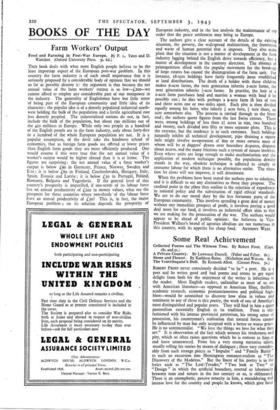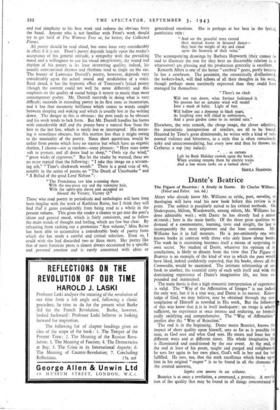Some Real Achievement
A Private Country. By Lawrence Durrell. (Faber and Faber. 6s.) Stone and Flower. By Kathleen Raine. (Nicholson and Watson. 6s.) The Ventriloquist's Doll. By Kenneth Mott. (Cresset Press. 5s.) ROBERT FROST never consciously decided " to be " a poet. He is a poet and he writes good and bad poems and seems to get equal delight from both for the enjoyment of the writer is infectious to the reader. Most English readers, unfamiliar as most of us are with American literature—as opposed to American films, thrillers, academic research, economic pronunciamentos and political high- blow—would be astonished to discover how alien in values and sentiment to any of these is this poetry, the work of one of America's most distinguished and popular poets. They will find in him a quiet pastoralism essentially English in its tradition. Frost is old- fashioned with his intense provincial patriotism, his strong sense of possession, his countryman's realisation that natural forces cannot be influenced by man but only accepted with a better or worse grace. He is no sentimentalist. " We love the things we love for what they are." It is observation of the faCt which arouses his tenderness and pity, which so often raises questions which he is content to hint at and leave unanswered. Frost has a very strong narrative talent, usually telling his stories by means of dialogues ; these vary consider- ably from such strange pieces as " Impulse " and " Family Burial " to such an excursion into Hemingway romance-realism as " The Discovery of the Madeiras." But the finest of his poetry is in the lyrics such as " The Leaf-Treader," " Two look at Two" or "Design " in which the artificial boundary, erected so laboriously between man and nature in the last century or so, is obliterated. There is an unemphatic, passive tenacity in him, a smouldering and intense love for the country and people he knows, which give force
and real simplicity to his best work and redeem the obvious from the banal. Anyone who is not familiar with 'Frost's work should try to get hold of The Witness Tree or, far better, the Collected Poems.
All poetry should be read aloud, but some loses very considerably
in effect if it is not Frost's poetry deperids largely upon the reader's acceptance of his general attitude, a sympathy with the prevailing mood and a willingness to use his visual imagination; the sound and rhythm of his poetry is its least interesting quality; indeed, his usually conventional rhymes and rhythms tend to jingle on the ear. The beauty of Lawrence Durrell's poetry, however, depends very considerably upon the actual sound and modulation of a voice. Read aloud, it has the hypnotic effect of Tennyson's lyrical poetry (though the content could not well be more different) and this emphasis on the quality of sound hrings it nearer to music than most contemporary poetry. Mr. Durrell succeeds in doing what is very difficult; succeeds in recording- poetry in its first state as incantatipn, and it has that mesmeric brilliance which, comes to words caught between sleeping and waking and which is usually lost in the writing down. The danger in this is obvious: the poet tends to be obscure and his work tends to lack form. But Mr. Durrell handles his forms with considerable skill and the poems have a natural flow from the first to the last line, which is rarely lost or interrupted.' His•mean- ing is sometimes obscure, but this matters less than it might owing to the musicality of the poetry., Since short quotations would be unfair from poems which have-no stanzas but which have an organic rhythm, I choose—not at random—some phrases : " Here stars come
soft to pasture, and all doors lead to sleep," " Owls sip the wind,"
" green wicks of cypresses." But let the reader be warned; these are no more typical than the following : " I take this image on a scream- ing nib," " Time's clockwork womb." There is a' good vein of wit, notably in the series of poems on " The Death of Uncebunke " and " A Ballad of the good Lord Nelson ": .
" The Frenchman saw him a-coining there
With the one-piece eye and the valentine hair, With the safety-pin sleeve-and occupied air Aboard the Victory, Victory 0."
Those who read poetry in periodicals and anthologies will have long been familiar with the work of Kathleen Raine, but I think they will find thaf it gains considerably from being read as a whole in the present volume. This gives the reader a-chance to get into the poet's idiom and general mood, which is fairly consistent, and to follow the main trends of thought and feeling, which are few but clear. By refraining from rushing out a premature "first volume," Miss Raine has been able to accumulate a considerable body of poetry from which she has made a careful and critical selection. Even so, I could wish she had discarded two or three more. Her poetry like that of most feminine poets is almost always occasioned by a specific and personal emotion and is rarely concerned with ideas or
generalised emotions. She is perhaps at her best in the lyrical, pantheistic vein: " And see the peaceful trees extend
-theft myriad leaves in leisured dance—
they bear the weight of sky and cloud upon the fountain of their veins."
The accompanying drawings by Barbara Hepworth (they cannot be said to illustrate the text for they bear no discernible relation to it whatsoever) are pleasing and the production generally is excellent.
Kenneth Allott is one of the better " cerebral " poets, partly because 'he has a cerebrum. The pessimist, the romantically disillusioned, the lookers-back, will find echoes of all their thoughts in his work, though perhaps more succinctly expressed than they could have
managed for themselves: , • • " There's no clock Will . not run down, what Switzer fashioned it No passion but an autumn wind will model Into a mask of habit. Light of foot
-
Will hollow out a doorstep in black years;'
As laughing eyes will cloud- to seriousness,
And a great garden come to its nettled ruin."
Elsewhere, the trite remark, the cheap image, the clever adjective,
the journalistic juxtaposition of similars, are all to be found.
Haunted by Time's great diminuendo, he writes with a kind of, sub-
normal violence and bitterness, in a style that is often consciously jerky and unaccommodating, but every now and then he throws his
Cerberus a sop (my italics):
. . . as cartons Left by Bank Holiday crowds upon the beach When evening returns them by electric trains And a low moon loOks on a ruined shore."
SHEILA SHANNON.



























 Previous page
Previous page